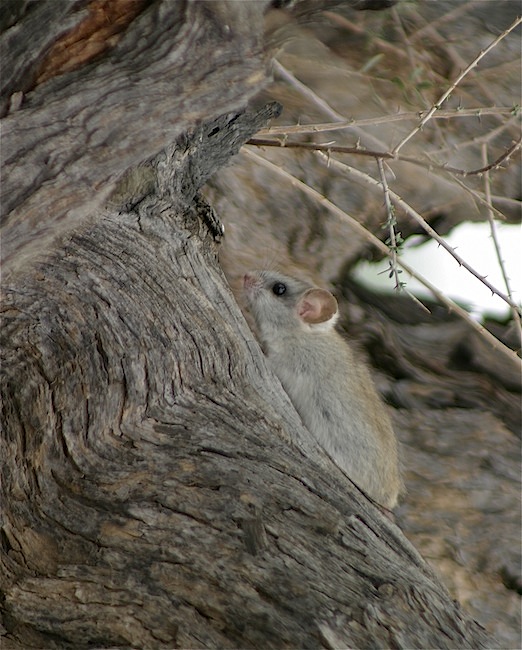Family: Muridae
Geographic Range
Acacia rats are found in sub-Saharan Africa. They occur widely from the southern-most portion of Ethiopia, south to the east coast of South Africa. Their range extends to the west coast of Angola, through Zambia, Malawi and Zimbabwe.
Habitat
Acacia rats live under the frayed bark of acacia tree trunks and branches, primarily Acacia xanthophloa and Acacia tortilis.

(Nossob walking trail, KTP)
Reproduction
There is little information on the mating system of Acacia rats. They give birth to 2-5 young per litter during the summer rainy season, when acacia foliage is present. Similar to many other murids, acacia rats are polygynandrous. Males expand their home ranges during breeding season.
Behavior
Little is known of the general behavior of acacia rats. They are arboreal and nocturnal, with nightly activities beginning prior to dusk. They construct nests out of leaves, grass, and small twigs. They burrow along Acacia tree root structures and use these burrows in the winter months in the event of brush fires.
Diet
Acacia rats are primarily granivorous, feeding on the seeds and foliage of acacia trees. They also consume the berries, grasses, roots, buds, and gum of acacias. They have been observed foraging on Acacia tortilis and Acacia erioloba. The leaves of shepherd’s trees and seeds of buffalo thorn are also considered an important part of their diet. Food is generally brought back to the nest prior to consumption. Inedible plant materials are often used in nest making. They may also consume carrion or invertebrates when available.
Predation
Acacia rats inhabit the thickest and thorniest parts of Acacia trees, which is extremely effective in predator avoidance. Their coloration provides great camouflage and likely helps reduce predation risk. It is thought that owls are their primary predators, however, arboreal snakes are important predators as well.


